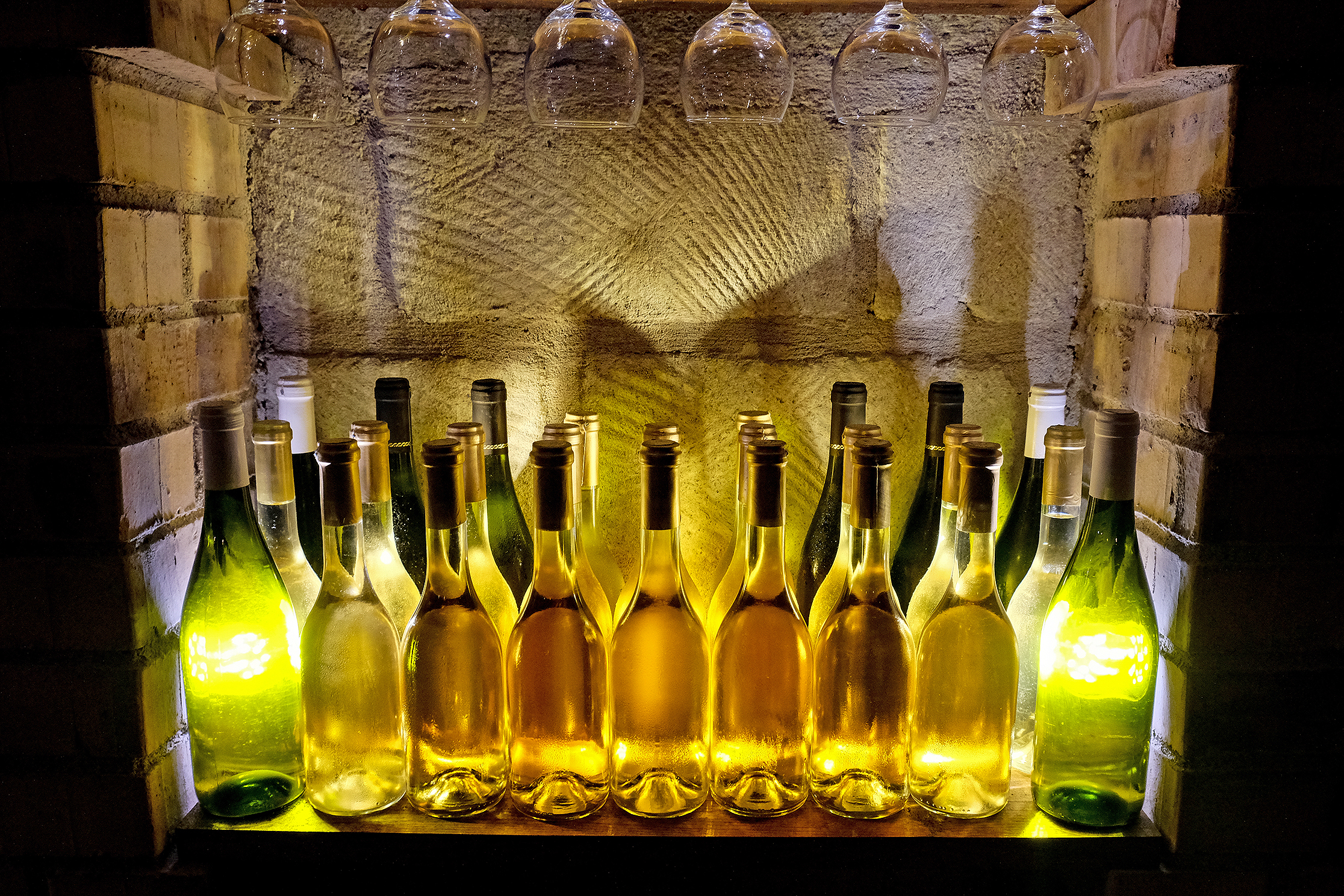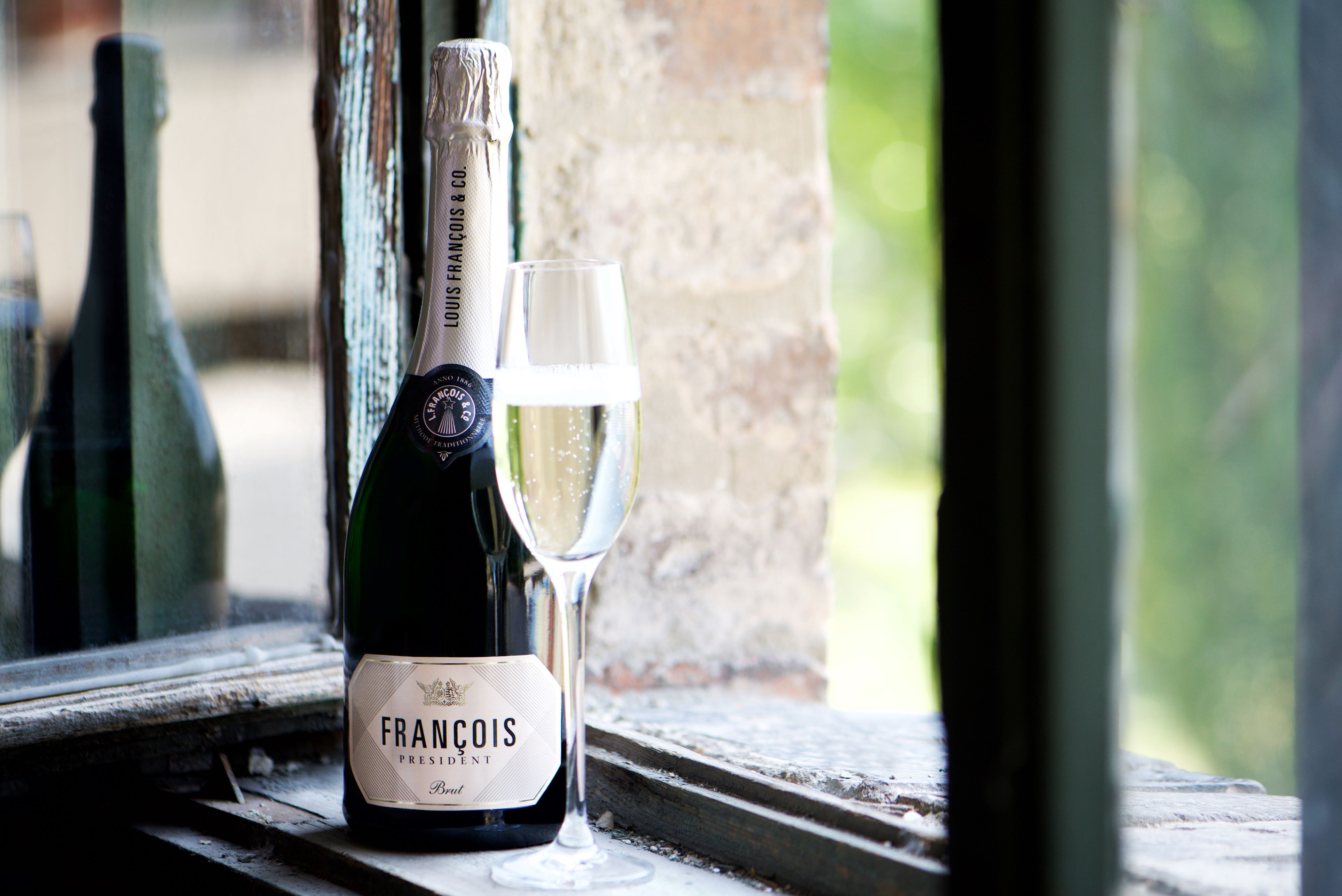Wine Industry Witnesses Mainly Domestic Tourism Revival

Bottles in a traditional Tokaj cellar. Hopes for wine tourism this summer lie with domestic visitors.
Photo by Yannick Martinez / Shutterstock.com
Hungarian wineries and wine bars are experiencing a rise in visitor numbers, although they look set to welcome mainly domestic visitors in the short run, with a few exceptions.
László Mészáros, managing director of Tokaj’s French-owned Disznókő, the first major estate you encounter as you enter the Tokaj region on the road from Budapest, and one which is delightfully surrounded by its own sloped vineyards, described two main sides to tourism.
“There are those visitors coming to taste the wines on the estate and those who travel to Budapest and buy wines in wine bars, restaurants, or at the airport, and the latter will be extremely limited,” he tells the Budapest Business Journal. He is more sanguine about domestic tourism, however.
“I’m quite optimistic that domestic tourism will happen. Mostly Hungarians will come and visit,” he says. Foreign visitors to the estate will certainly be missed as they tend to buy the more expensive wines.
“Hungarian visitors usually buy wines for everyday consumption but less in the way of Aszú [Tokaj’s signature botrytized sweet wine], which foreigners often buy,” he says.
Before the COVID pandemic, Taste Hungary was a dynamically expanding company, owned and run by the husband and wife team of Gábor and Carolyn Bánfalvi. They employed more than 30 guides and sommeliers, taking guests on wine and food market tours and running regular tastings at their cellar room called the Tasting Table, at Bródy Sándor utca 9.
Now, it has just two full-time sommeliers, having unsurprisingly witnessed the mass cancellation of its wine tours and tastings almost overnight at the outbreak of the pandemic.
Gábor Bánfalvi tells the BBJ that the summer is expected to be very slow, although he does see signs of improvement from the fall.
Flexible Friends
“Summer is going to be poor. So far, nothing has really changed [since the outbreak of the virus]; we’ve had some bookings for tastings for small groups of foreign visitors who are in Budapest for the [Euro 2020] football matches,” he said. Looking further ahead, though, Bánfalvi is cautiously optimistic.
“We do have reservations for tours, including a group going to Croatia. Everyone is using flexible cancellation for their booking with us, and we also request it from hotels. Everyone has to be flexible,” he said.
“There’s definitely demand for the fall; if circumstances don’t get worse, then it could lead to a slow to medium recovery.”
Before the pandemic, Taste Hungary had already diversified from tourism by exporting wines to the United States and European Union member states and has also opened a wine shop opposite the Tasting Table at Bródy Sándor utca.
Roland Mátyási, owner of the Ménesi wine bar at Ménesi út 1, in District XI, is seeing a revival in business.
“We’re bouncing back now following the easing of restrictions at the beginning of June. Having a terrace helps, and it’s usually full, although premium wines are not selling in summer, as guests go for lighter, more aromatic wines,” he tells the BBJ.
Having spoken recently to other wine bar owners, he says the consensus is that business is currently at 60%-70% of its usual volume for the time of year.
“We had a few busy days in the last weekend of April, but then visitor numbers fell as people probably came to the realization that it might be risky to go to bars and that they’d better get vaccinated first,” said Mátyási. “Then, the weather was very poor in May, which kept people at home instead of visiting the terrace.”
Like Bánfalvi, Mátyási also mentions that his wine bar has been receiving guests from the Czech Republic, France, and the Netherlands, who have been in Budapest for Euro 2020.
The Polish Factor
An emerging trend in the northeastern region of Eger is that Polish people have been buying holiday homes in the area, attracted by the wine and wellness facilities, explains Csaba Csőrös, head of food and beverage at the Bolyki winery.
“We’re expecting Polish visitors to return, along with Hungarians,” he said. The winery is located in dramatic surroundings on a former mine site, and has recently added a state-of-the-art new winery building.
Over in Egerszalók, the St. Andrea winery has been busy during the pandemic and has been adding to its guest facilities, building a new tasting center that connects directly to the cellar.
Meanwhile, back in the town of Eger, Tibor Gál is set to build a striking modern new winery opposite his Fúzió wine bar-cum-restaurant on Csíky Sándor utca, which he says will further enhance visitor experiences. He has also sold his “wine box” bar in Eger’s Szépasszonyvölgy. Dropping in on the valley a couple of times recently, a few out-of-towners could be seen sipping wine on the terraces.
Back in Budapest, the 10th edition of the Rosalia festival will take place in Budapest’s City Park from July 2-4. Only people carrying a card proving protection against COVID-19 are permitted to enter, either issued by the Hungarian authorities or by a country with which Hungary has a bilateral agreement on the mutual acceptance of vaccination cards.
The Rosalia festival hosted some 30,000 guests in 2019. Sixty wineries will be present this year. While the festival is a feast of rosés, exhibitors will also be pouring other wines. A blend of Merlot and Pinot Noir by the Paulus Molnár Borház from the region of Mór, called “Nincs szebb szín a rosénál” (“There is no nicer color than rosé”) was selected by a blind tasting panel as the wine of the festival, winning through a field of 60 rosés.
This wine can be tasted at the stand of the main sponsor, Spar, at the festival and bought from June 24 at Spar and Interspar supermarkets. It has a bright salmon color, and it oozes strawberries and raspberries on the nose and palate. It hits a lovely balance between freshness and fruitiness, but it also has a round, slightly creamy finish that gives it a nice depth and mouthfeel.
This article was first published in the Budapest Business Journal print issue of July 2, 2021.
SUPPORT THE BUDAPEST BUSINESS JOURNAL
Producing journalism that is worthy of the name is a costly business. For 27 years, the publishers, editors and reporters of the Budapest Business Journal have striven to bring you business news that works, information that you can trust, that is factual, accurate and presented without fear or favor.
Newspaper organizations across the globe have struggled to find a business model that allows them to continue to excel, without compromising their ability to perform. Most recently, some have experimented with the idea of involving their most important stakeholders, their readers.
We would like to offer that same opportunity to our readers. We would like to invite you to help us deliver the quality business journalism you require. Hit our Support the BBJ button and you can choose the how much and how often you send us your contributions.








